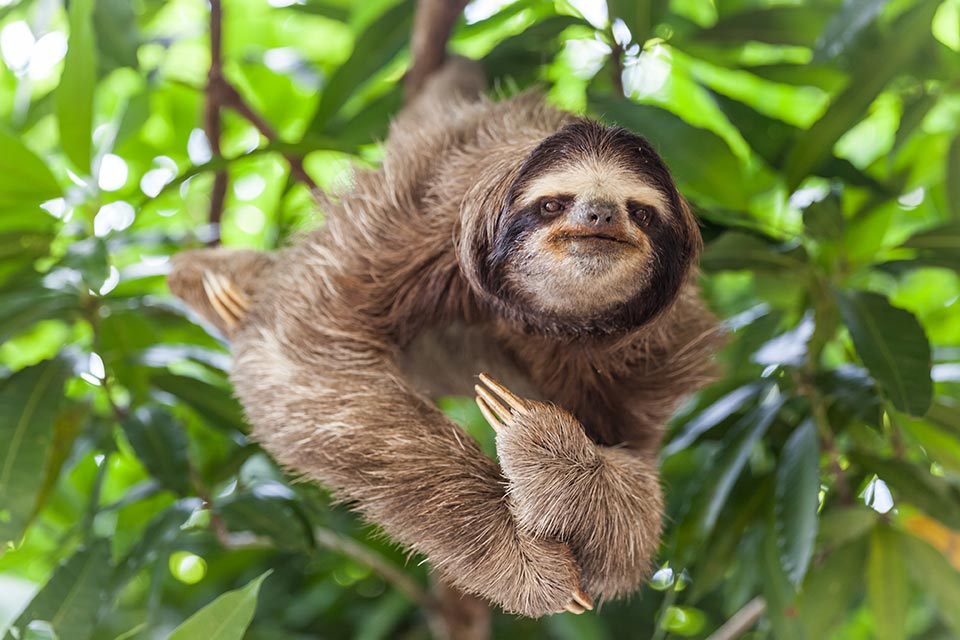|
A President of Trinovante (formerly the Women's Guild, Romford), it is my honour provided them with two talks a year. My most recent talk explored the life of a sloth and the benefits their lifestyle could have for us humans. We covered basic facts about sloths, such as they eat, sleep and give birth whilst hanging upside down. They have more neck bones than any other animal, enabling them to turn their head 270 degrees. There are six species of sloth and they are found in South and Central America. All sloths have three toes, even though two types are called two-toed sloths. They eat the leaves of the cecropia tree; it can take up to one month to digest one leaf! They spend 90 per cent of their time motionless; go to the toilet once every two to three weeks; give birth to one baby at a time; have an average lifespan of twenty-five years; have been on the planet for a least 64 million years. So, what can we learn from such an animal that was once described in an encyclopedia of sciences in 1749 as the "lowest form of existence"? Be laid back. Sloths really only have four things to think about: sleep, food, reproduction and toilet. So, perhaps we should declutter our lives, prioritise and concentrate on what is important. Slow down. Sloths move at most four metres a minute. Living in trees, they take great care to test the branch before they grab onto it to ensure it can take their weight. They are fully aware of their circumstances, they enjoy the moment and they focus on one thing at a time, as could we: learning to relax, breath efficiently, and acknowledge every move that we make. Go green. Sloths only need 160 calories a day and they eat low energy leaves. They spend time in nature and, therefore, perhaps we should also eat more greens and appreciate our surroundings: walk in a park or a forest and wonder at the beauty of nature, or slow down wherever we are and observe the goings on around us. Sloths enjoy the occasional hibiscus flower and so, we too should remember to give ourselves a treat every now and then. Sloths have very little ears and have poor hearing. As a consequence, they do not flinch at sudden noises and keep on persisting with whatever task they are pursuing. Likewise, we should not take notice of nasty comments from other people, but keep persevering with our ambitions. A touch of selective hearing will not do us harm. Sloths are born with a smile and are a picture of serenity. We, therefore, could practice smiling more and enjoy life as it comes. Sloths live upside down. Perhaps if we have problems, we should totally change our perspective. Just as sloths can move their heads 270 degrees, we could look at our difficulties from different angles and reframe the situation. Sloths stay cool. They are excellent swimmers. They know what makes them happy. We ought to ensure we have a list of things we can always refer to that make us happy, too. A downside of a slow digestion process is sloths suffer from trapped wind. They turn this negative to a positive, however, because it helps them keep afloat in water. Therefore, we too should try to turn a negative into a positive. Can we even redefine what success means to us? Sloths enjoy their own company. They enjoy nature. They opt out. They do not feel that they should socialise all the time. We too can embrace solitude, using the time for deeper thinking, concentration and learning to like ourselves. They tend not to stick their noses in other sloths' business; a lesson for us, perhaps! Sloths sleep 60% of the day, therefore, we must remember sleep is good. Sloths take a long time to eat their food. We should eat more slowly and, perhaps, enjoy family time together around a meal table. Baby sloths are born knowing how to hug, so they can keep hold of their mother for the first six months of their lives. The skill of hugging is taken into adult life, where they hug trees, even in their sleep. Perhaps we should rediscover the power of the hug. From my research, I discovered a few interesting quotes I would like to share with you. "There is no hurry, we shall get there someday." A. A. Milne "Slow and steady wins the race." Aesop "Nature does not hurry, yet everything is accomplished." Lao Tzu "To do nothing at all is the most difficult thing in the world, the most difficult and the most intellectual." Oscar Wilde And my favourite quote is by Jiddu Krishnamurti: "If your eyes are blinded with your worries, you cannot see the beauty of the sunset." Acknowledgement goes to: Hazel Stainer, for helping with the research. McCartney, J (2018) The Little Book of Sloth Philosophy. HarperCollins Publishers Cooke, L (2018) Life in the Sloth Lane: Slow Down and Smell the Hibiscus. Workman Publishing Picture: Keele University
0 Comments
Your comment will be posted after it is approved.
Leave a Reply. |
©Copyright
We are happy for you to use any material found here, however, please acknowledge the source: www.gantshillurc.co.uk AuthorRev'd Martin Wheadon Archives
June 2024
Categories
All
|

 RSS Feed
RSS Feed